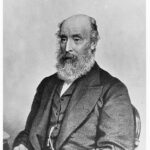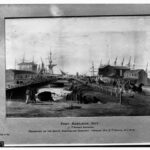Robert Richard Chute Torrens was born on 31st May 1812 in Cork, Ireland, the son of Robert Torrens, of the Royal Marines and the petty Derry gentry, and Charity Herbert Chute, of the greater Kerry gentry. Divorced by 1819, the father pursued his interests in England and the son stayed within the maternal sphere, attending a private academy in Cork and then Trinity College, Dublin, graduating B.A. in 1835 (M.A. by grace, 1839). Father and son teamed up in 1836 when young Torrens went to London to learn about customs collection by working as a landing waiter in the Port, and Torrens senior chaired the South Australian Colonization Commission. Together they worked on raising customs duties to finance the new colony and on promoting Irish investment and emigration. On 19th February 1839 young Torrens married Barbara Ainslie Anson (née Park) and in 1840 they emigrated aboard the Brightman to South Australia where the father had had the son appointed Collector of Customs.
There Torrens plunged into ‘a pattern of unorthodoxy’. Notorious squabbles with shipowners, merchants, settlers and customs staff led to acrimonious disagreements with successive Governors. Discord stopped neither his advancement nor further conflict with Governors and leading colonists. A nominated Legislative Councillor in 1851-57 and Executive Councillor in 1855-57, Torrens became Colonial Treasurer and Registrar-General of Deeds in 1852. The next six years he spent agitating to reform the slow, expensive and ineffective transfer of land by deed. In 1857, on the strength of his radical proposals, he topped the polls for the seat of Adelaide in the first Parliament under responsible government and was Premier for a tumultuous week in September of that year. His Real Property Act, whereby every transfer of real estate was to be registered with the government, was stormily passed on 27th January 1858 and took effect on 1st July.
The system encompassed free trade in land and borrowings from ship bottom administration, as well as Torrens’ working knowledge as Registrar-General and as a landowner in his own right. It also incorporated the radical ideas of fellow colonists, in particular the principles of land transfer registration of the Hanseatic League cities. The package was supported in principle by the 1857 English enquiry into title registration. Torrens marshalled these elements behind the scenes, politicized the programme in public and fought off its detractors (mainly lawyers) everywhere. He also brought the scheme into practice as Registrar-General of Titles, earning one of the highest colonial salaries.
He oversaw considerable amendments in 1859 and in 1861, mainly administrative details but also relating to the handling of equitable interests. Not even complete overhaul as the Real Property Act 1886 (still in force in South Australia) can deny the reality that Torrens’ dedication to his cause had given life to the package of influences and factors that lay within it. Meanwhile, Queensland adopted the unreformed version in 1861 and, with Torrens’ direct involvement, New South Wales, Tasmania and Victoria implemented the reformed version.
Returning to the United Kingdom, Torrens lectured on land title registration and lobbied for its implementation, especially in Ireland. In 1868 he won the House of Commons seat for Cambridge, only to lose it in 1874, after which he largely withdrew from public life. For his services ‘in connection with the Registration of Titles to Land Act’ he was knighted (K.C.M.G. 1872, G.C.M.G. 1884). The Queensland, New South Wales, Victorian and Tasmanian Parliaments all voted him their thanks, though South Australians declined in 1880 to give him an annuity of £500. He had built ‘Torrens Park’ (now Scotch College) near Mitcham in 1854 and, in retirement, ‘Hannaford’ in a remote Devon village. He died at Falmouth on 31st August 1884 and was buried at nearby Leusdon Churchyard.






Comments